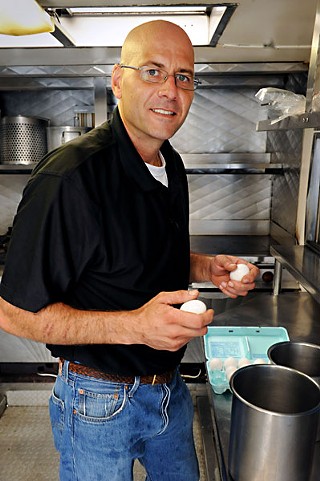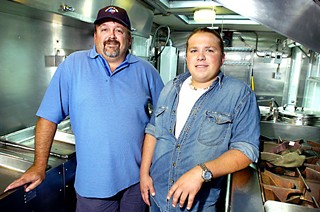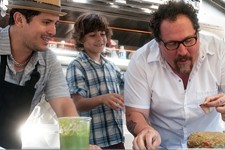There Will Be Food
Austin's film catering gurus learn how to make do in a changing industry. Spoiler alert: The answer is never pizza.
By Jeff Winkler, Fri., June 14, 2013
"An army marches on its stomach."
– Napoleon (attrib.)
Weddings – particularly catered weddings – are "never really reality," says Texas Kitchen Divas owner/chef Kay Wheeler. She sits inside her sweltering food truck, where she's preparing a catered meal for about 10 people. "This is. These are real people; they just want to eat real food."
"This" is a film shoot for a horror-comedy being shot on Willie Nelson's Spicewood property. Wheeler's truck is smack-dab in the middle of Nelson's semi-neglected old Western film set, Luck Ranch. The single-street town comes complete with three-dimensional facades of a saloon, general store, and church, where a plaque advertises weekly sermons from the cosmic cowboy himself. Wheeler will later unintentionally quote Daniel Plainview in There Will Be Blood when she refers to Joel, the other caterer on set, as "my son and partner."
So the sets are fake and the lines are straight from scripts, but this movie-world is reality. James Franco doesn't make art this meta.
But even some of the basics here are unexpected. Sure, it's about 6:30, and Kay is serving breakfast an hour before the production's first call time. And yes, the crew arrives in slow spurts, some even stretching, yawning, and moving like morning zombies in a horror-comedy. But this is a night shoot. It's 6:30pm.
Kiss the Cook
Everything's prepared in Wheeler's food truck with its fully stocked fridge and commissary, complete with every item and ingredient she'll need to prepare and serve two meals. Wheeler does say "wakey, wakey" to one sleepy crew member, but she forgoes the coda, "eggs and bakey." She's not serving eggs. Or bakey. That's because on warmer-weather shoots beginning in the late afternoon, "nobody really wants eggs," says Wheeler – who "found that out" at some point during the three years she's been a film caterer – so a sandwich spread it is. Around midnight, the crew will have lunch – barbecue, sweet potato fries, and stuffed jalapenos – all made from scratch. Her day starts a few hours before the film crew begins working and ends a couple hours after; 14-hour workdays are a lowball average. Then she'll have a weeklong break, "if we're lucky," before moving onto a new production to do it all over again.
This is the maddeningly standard reality of film caterers in general. All of the major Austin-based film caterers say so. Whether it's the big companies like Locations Catering and Hat Trick, chef J.F. Montminy's mid-size operation, Ready to Serve, or smaller ventures like Texas Kitchen Divas, the hours are unbelievably long, prepping food on-site is a must, and it's probably a good idea to know a thing or two about emergency truck repair. (There's a reason film credits quite often include someone whose title is "Chef/driver.")
And there's a reason why film caterers are as important on a shoot as the camera operator.
While the Texas Film Commission lists about a dozen Austin-based film caterers, Montminy said there are probably only about six regular companies like his, "and that's being generous."
After 15 years as a hotel chef, Montminy got into film catering, "a totally different beast." That ain't no joke. If you've ever worked in a kitchen, you know the pace, hours, and pressure. Film catering is even more intense. Wheeler said that one of the biggest challenges is that film caterers have to constantly impress the clients and crew.
"If you cook for 30 days in a row ... you generally have 30 different menus," she said. Just imagine a restaurant that changes its entire menu every day. And for good measure, that same restaurant is a food truck whose location changes as quickly as a stoplight.
Catered meals are "about keeping the cast and crew happy," says the producer of the aforementioned horror-comedy, about which I'm not allowed to say jack. "The cast and crew are busting their ass all day, and then to have a fully catered, home-cooked meal is just a huge morale boost."
This producer is fairly new to the live-action game, but he quickly learned about the importance of film catering. During his previous outing, they finally had "enough crew and enough cast where we had to, you know, feed them the real way instead of ordering pizzas." The crew's first question had apparently been "OK, we're here, where's breakfast?"
"We were like, 'Uhhhhh, can somebody go down and pick it up?'" said the producer, who noted that you can't really get away with feeding a hard-working crew fast food. "I would say you can probably get away with bringing in pizzas once or twice, but ... even when I have a little money, picking up pizzas is almost never the answer," he said. Other film people reiterated this point, including local producer Megan Gilbride: "There's a phrase – I haven't heard [it] a lot recently, but it would kind of go around: 'Oh, is this a pizza movie?'"
Feast or Famine
But the filmmakers aren't the only ones who've had to learn on the fly. As the Austin film industry evolves and adapts, so too must the people who feed its members.
"Film work in Texas can be a little feast or famine – no pun intended," said Gilbride. "Everybody has to be able to make do when there's slow time, and caterers have to be kind of flexible."
Some "slow times" are pretty obvious – Texas' summer heat. Then there's the financial incentives, which – like other states' – have waxed and waned in the past decade. Nine years ago, Austin and Shreveport, La., were the hotspots for filming. But a longtime film caterer in Louisiana told me the boom has "pretty much dried up," while Texas' budding film industry has also experienced a few lean years.
Not that the business isn't a feast for some. Browse the credits of recent, major motion pictures filmed in and around Austin – The Tree of Life, every Robert Rodriguez film – and you'll notice a pattern. They're all catered by David Long's Locations Catering.
Long's operation is almost an industry unto itself: His company can feed hundreds of crew members and numerous extras. This very paper ran a lengthy piece ("Feeding the Film," Food, Aug. 6, 2004) on Long and fellow local-big-shot Paul Kuzmich, of Hat Trick Catering. But that was nearly 10 years ago. When Long called to chat about the current state of the Texas film industry, he was huffin' it down a New Orleans street; his last project in Austin was Sin City 2.
"Texas is not such a great spot for catering anymore," said Long. "The hottest spot outside of L.A. and New York right now is Atlanta." Right now, "Georgia has the best incentives. It's all about the money."
Kuzmich only ditto'd this point – "I don't do much in Austin," he said. Although he caters "big or small movies, I don't care," Kuzmich's services are "not cheap." He started out in L.A. before moving to Texas 13 years ago for what sounds like the same reasons he's steadily leaving. Kuzmich now has operations in several other states as well as abroad in London. Even if "Austin is a great town to live," the Texas film industry has become about as passé as, well, L.A.
"Ever since the economy went into the crapper in 2008, the movie industry is not as much run by the producers anymore ... it's run by the accountants of the studio. There's a number and that's what you get." But good news for Georgians: "There's a lot of work in Atlanta."
Of course, things took a surprising turn for the better in recent weeks, when the Legislature, which many had anticipated would cut the already-low $32 million in film incentives, actually increased the figure to $95 million over the next two years.
"The financing is always great from the state funding, it's just that overall the program is a bit more conservative than New Mexico, Louisiana, or Georgia's program," said Gilbride. "But even though it's a more conservative program, it's a well-run program, it's a very transparent program, and the crews kind of can't be beat."
That good news came on the heels of NBC announcing it's moving production of the show Revolution to Austin for its second season. The announcement of the definite project seemed to pique Gilbride's interest more so than possible future incentives.
"That will provide a lot of stability for Austin folks," said Gilbride. "And it's great that there's a show like that that can be a long-term project in town."
Commercial Gain
Whenever there's not a long-term gig on the horizon, though, film caterers have to switch-hit. Montminy's last local project was catering for the highly praised, local favorite Mud by writer/director Jeff Nichols, but he's also catered plenty of TV pilots and the series Walker: Texas Ranger. Like the others, he finds work where he can. Because he has a family, Montminy will "try and make [projects as] close to home as much as possible." Not that he doesn't travel: Montminy just finished catering a Robin Williams film ... in Atlanta.
"I do just about everything I can," said Montminy over the phone." [The Atlanta gig is] a fairly decent project but not a huge mega picture. We do what we can to survive."
Although "definitely incentives play a huge role in who comes to Texas," Montminy seemed more interested by a more immediate project. "Did you hear the TV series Revolution is coming to town?"
The show starts shooting this month and "they asked me to put a bid together, and I did. And now I'm crossing my fingers; hopefully we'll get it. It's still very competitive for me here in Austin," said Montminy, and he's not the only one who says so.
Small-to-midsize film work can last for a couple of days to a couple weeks, catering for anywhere between 10 and 100 people. Surviving often means working on very small, days-long projects like a commercial. It's steady work.
"Austin is like a really, really busy place to shoot commercials," said local commercial producer Buttons Pham, a veteran of the scene. "I'm busy all the time. And it doesn't seem to be slowing down much at all. ... There have been months where you can't find crew because it's been so busy."
Texas being Texas, the landscape varies so dramatically that you can shoot a desert scene one day and a Hill Country scene the next. It's like New Zealand, but with fewer hobbits. Perfect for those all-terrain car commercials. For their part, Kay Wheeler and her son "really like the commercials," not only because they are "happening around here really, really well," but also because of "the personal connection you can have with the client [and crew]. I'll take that any day over the big jobs." Wheeler said her favorite project to work on, though, was Gordon Ramsey's Kitchen Nightmares. She fed chefs that were "helping" other chefs feed people, adding another layer to the reality of craft services.
Back to Reality
Sometimes, that connection between a film shoot and its catered food can be so blurred as to make the two indistinguishable.
Actor and L.A.-transplant Chris Doubek's first job on a Hollywood film was as an actual caterer. From then on, he's apparently been typecast – be it "reality" or "movie-reality." During his first gig with Richard Linklater in 2006, Doubek starred as "the hand opening the hamburger in Fast Food Nation." You may have missed it. But when Doubek got top billing in Bryan Poyser's widely acclaimed black comedy Lovers of Hate in 2010, the "tiny crew" took turns making each other meals. Cooking for the crew was "a way to stay in the groove on my off-days. And the kitchen was the same size as my Austin efficiency apartment, which was thrilling."
For Doubek, it's simple: A well-fed crew is a happy crew, and a happy film crew makes good movies.
"It's very important not to scrimp on your food for actors. Have you seen school lunches? And you wonder what's really wrong with American education today? Huge connection," said Doubek. "You get pizza craft service, you get a pizza movie. That's all I'm saying."
Special thanks to Rocky and the rest of the crew at Vulcan Video for their generous research assistance. Follow Jeff Winkler on Twitter @ThatWinkler.












